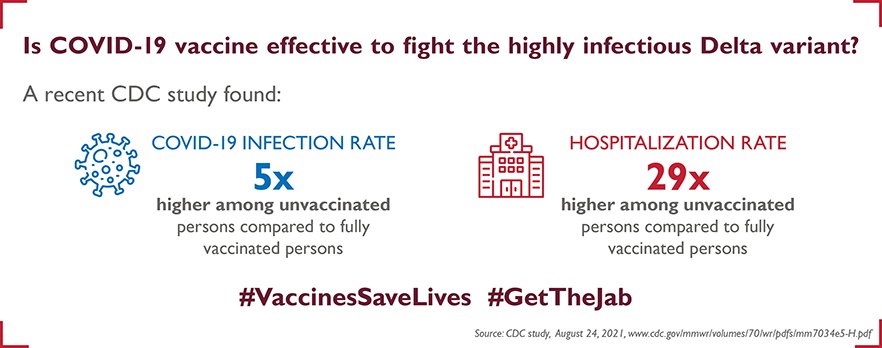Putting the Pandemic Behind Us: Safety and Efficacy of the COVID Vaccine
By Anton Luchytsky, Principal Technical Advisor, Infectious Diseases, MTaPS
As the SARS-CoV-2 virus, which has caused massive disruption and more than 4.6 million deaths worldwide, continues to adapt and mutate and concerns about the impact of Delta grow, a lot of questions come up: Do vaccines work? Do I need to get vaccinated? Do I need the vaccine if I already had COVID-19?
For most people, vaccine safety and effectiveness are the most important decision factors.
Let us review safety first.
More than 5.5 billion doses of COVID-19 vaccines have been administered, including more than 370 million doses in the United States, which has one of the strongest safety surveillance systems in the world. There is always a chance of something that has not been detected yet, but enough data have been collected and analyzed that we know most side effects. What are they? Comparing numbers per million population, serious safety problems are very rare (table below), with small variations among vaccine brands, and are comparable to incidence rates of these events in the general population.
Table: Serious adverse events after COVID-19 vaccination (Source: CDC)
| Reported Adverse Events | Rate of Incidence |
| Anaphylaxis | 2–5 per million vaccinated |
| Thrombosis with thrombocytopenia syndrome | 3 per million doses of J&J/Janssen vaccine 8–10 per million doses of AstraZeneca vaccine (Europe and UK) |
| Myocarditis and pericarditis | 2 per million doses of mRNA COVID-19 vaccine |
| Guillain-Barré Syndrome | 13 preliminary reports per million doses of J&J/Janssen vaccine |
| Death (link with C19 vaccine not established) | 7,400 reports per 370 million doses (0.0019%) |
 Given the very rare incidence of adverse events, COVID-19 vaccines are safe, and the benefits far outweigh the risks. For comparison, the cumulative risk of death from COVID-19 (552 per million population) or hospitalization (7,420 per million population in the US) is overwhelmingly larger. A significant proportion of hospitalized people (>20% in older age groups) require intubation and treatment in intensive care units.
Given the very rare incidence of adverse events, COVID-19 vaccines are safe, and the benefits far outweigh the risks. For comparison, the cumulative risk of death from COVID-19 (552 per million population) or hospitalization (7,420 per million population in the US) is overwhelmingly larger. A significant proportion of hospitalized people (>20% in older age groups) require intubation and treatment in intensive care units.
Persistent symptoms can remain long after the acute SARS-CoV-2 infection—a condition now coined Long COVID. The five most commonly reported symptoms are fatigue (58%), headache (44%), difficulty concentrating (27%), hair loss (25%), and shortness of breath (24%).
Household transmission of SARS-CoV-2 is common. Secondary transmission rates can be as high as 50%, and we may inadvertently expose our families to the virus.
COVID-19 vaccines are safe, but how effective are they?
In clinical trials, all authorized COVID-19 vaccines demonstrated efficacy (range 65–95%) against symptomatic, laboratory-confirmed COVID-19 in adults ≥18 years; high efficacy (≥89%) against severe COVID-19 that requires hospitalization; and high efficacy against COVID-19-associated death. Multiple studies from the US and other countries demonstrate comparable COVID-19 vaccine effectiveness in real-world conditions (77–97%) across brands.
Emerging data suggest lower effectiveness (67–88%) against confirmed infection and symptomatic disease caused by the highly infectious Delta variant. We also see that Covid vaccine immunity can fade over time. A reported outbreak among fully vaccinated people was alarming, but it is critical to see the totality of data: very few people get seriously ill after full vaccination. The vaccine continues to be very effective (>90%) against severe disease, reducing the risk 10-fold or greater.
Data underscore the decision: Say yes to the COVID shot!
Given the wealth of data, getting vaccinated as soon as possible is the safest and surest way to protect yourself, your family, and your community. The numbers show that new, emerging variants increase the danger, and vaccination can provide critical protection and save lives.

To reduce the likelihood and severity of potential future infection, all eligible persons should receive a COVID-19 vaccine.
Reinfection with COVID-19 has been documented. But vaccination offers 2.3 times better protection than previous Covid-19 infection as per a recent CDC study. So even if you have already had Covid-19, be sure to receive the vaccine to reduce further risks.
Bringing expertise to expedite safe and effective vaccination in countries
The USAID Medicines, Technologies, and Pharmaceutical Services (MTaPS) Program is a key partner for COVID-19 vaccination support, working with governments and partners in 12 countries—Bangladesh, Burkina Faso, Cameroon, Côte d’Ivoire, Jordan, Kenya, Mali, Mozambique, the Philippines, Rwanda, Senegal, and Tanzania—to accelerate COVID-19 vaccine deployment and uptake. Vaccine pharmacovigilance is an integral part of vaccine safety regulation and a critical area of MTaPS’ support to countries that puts in place a system to detect, assess, respond to, and prevent adverse reactions and events following immunization. Pharmacovigilance is an essential component of all immunization programs as it helps capture and address any safety issues in a timely fashion—a must for public confidence.
In countries such as Mozambique, MTaPS is providing regulatory assistance for new COVID-19 vaccines and related supplies to help expedite their registration and market entry through proper processes and protocols that ensure their quality, safety, and efficacy. Another big focus is supporting cold chain logistics and management to ensure the integrity of the supplied vaccines at the vaccine administration sites. The program regularly reviews the latest technical guidance and research publications and provides weekly summaries and a compendium of all publications so governments can make informed decisions and adjust their national policies, guidelines, and protocols.
These and our partners’ activities are working to ensure safe and effective vaccination of all populations because COVID-19 vaccines are our best shot for putting the pandemic behind us.